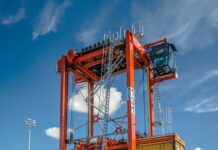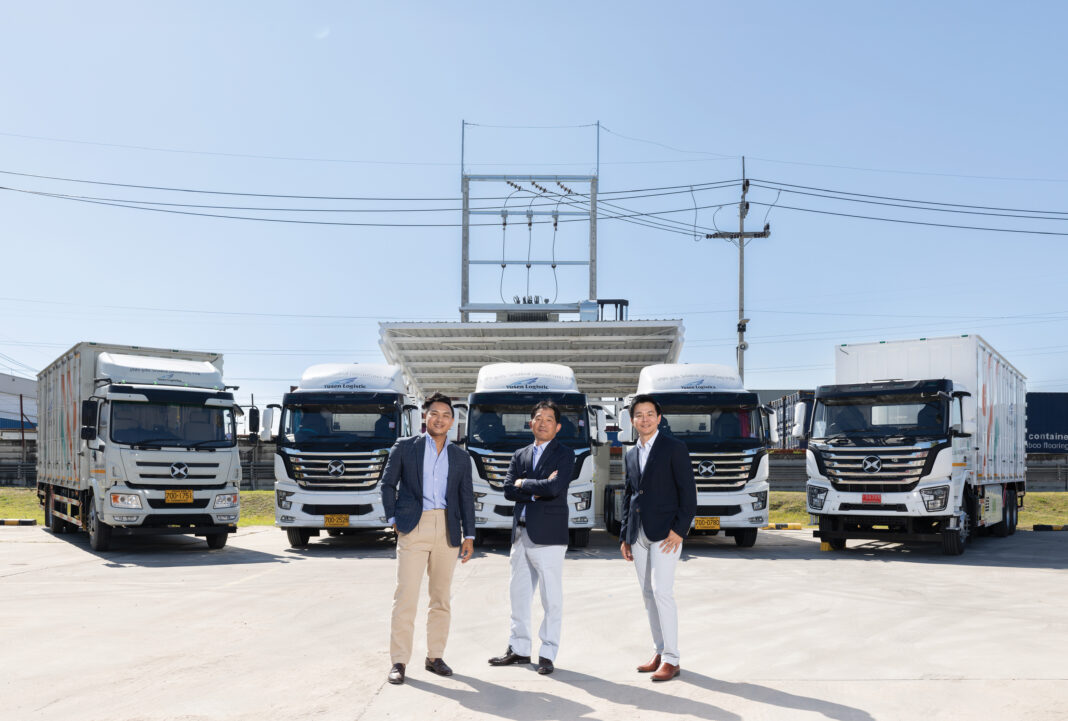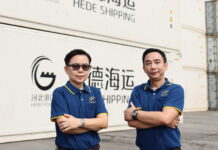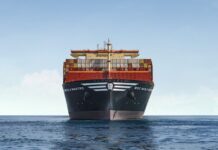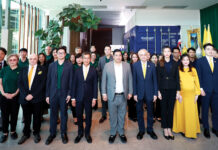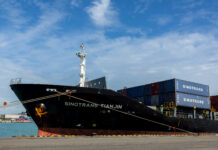Yusen Logistics Thailand has taken a decisive step toward reducing its carbon footprint by deploying a new fleet of electric vehicles (EVs) and establishing a dedicated EV charging station at its LLC3 warehouse in Chonburi, Thailand. This move aligns with the company’s commitment to sustainability and achieving significant CO₂ emission reductions in line with its 2030 and 2050 environmental targets. The project also highlights Yusen Logistics’ strategic response to evolving market demands, regulatory requirements, and environmental pressures within the logistics industry.
LM spoke with Mr. Koichi Hirose, Vice President & Chief Operating Officer; Mr. Suwajchai Paoprayoon, Executive Officer of Land Transportation Groups and Supply Chain Management; and Mr. Pimarn Nualhong, Executive Officer of Contract Logistics at Yusen Logistics Thailand, regarding the deployment of the EV truck fleet, including the newly opened EV charging station at Yusen Logistics’ LLC3 warehouse, which is powered by solar panels.
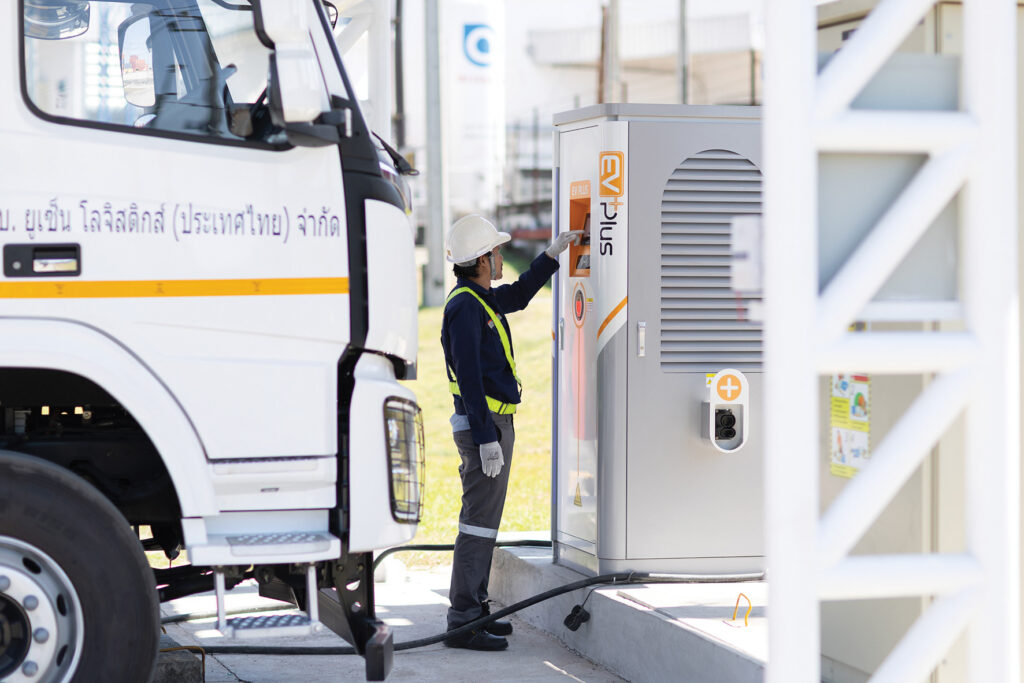
Strategic Vision for EV Adoption
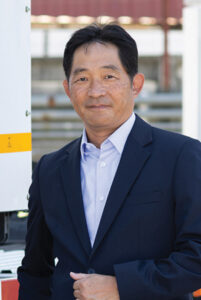
In 2022, Yusen Logistics outlined an ambitious sustainability roadmap targeting a 45% reduction in CO₂ emissions by 2030 (Scope 1), forming the foundation of its global net-zero commitment by 2050. This objective has driven the company to transition parts of its fleet from traditional diesel to electric vehicles.
Mr. Hirose explained the rationale for the switch to EVs: “Firstly, EVs are the most practical option currently available to achieve near-term emission reductions. With few alternatives offering comparable impact, EV trucks have proven to be a viable solution. Secondly, customer expectations and market trends increasingly steer logistics providers toward sustainable options. Specific customer requests for greener solutions, particularly in Yusen Food Supply Chain, a Yusen-Ajinomoto venture, operations, have further driven this decision.”
Another factor influencing Yusen’s strategy is the volatility of fuel costs in Thailand. Diesel prices, influenced by government policies, often fluctuate, making EV technology an attractive option to mitigate cost risks while transitioning to sustainable energy sources.
EV Fleet Deployment and Optimization

Yusen Logistics Thailand plans to add a total of 10 EV trucks by the end of its fiscal year, with five already in operation, primarily servicing clients in the chemical and automotive industries. These early deployments aim to test the performance and feasibility of EVs in demanding logistics tasks.
For instance, Yusen Food Supply Chain utilizes two EV trucks to transport goods between Ajinomoto’s factory and the distribution center. By assigning EVs to fixed routes, Yusen Logistics optimizes charging schedules, minimizes operational interruptions, and aligns with client requirements.
“This investment aligns with Yusen Logistics Group’s goal of achieving net-zero GHG emissions across all services by 2050,” said Mr. Suwajchai. “This fiscal year, we will add five more units, bringing the total to 10. Additionally, we plan to invest in 10 units annually over the next three years, resulting in a fleet of 40 EV trucks, including the five already in operation.”
Operational Challenges and Benefits
In daily operations, the transition to EVs has not caused major disruptions. While diesel expenses have decreased, depreciation costs have risen. However, the lower maintenance requirements of EVs offer some offset. A lack of reliable data on the long-term salvage value of EV trucks and end-of-life costs remains a challenge, but initial results are promising.
While the tangible operational advantages remain limited, Yusen Logistics has observed notable indirect benefits, including positive customer feedback and a boost in employee morale. According to internal surveys, staff motivation related to environmental, social, and governance (ESG) factors has increased, demonstrating the positive impact of the EV initiative on employee engagement and company culture.
“At the moment, we haven’t experienced any significant changes in operational efficiency, cost, or performance. However, we have started to see non-operational benefits. One notable example is the positive reputation, customer and market feedback, and increased employee motivation. Additionally, this investment helps us better achieve Yusen Logistics’ ESG goals, exceeding our expectations.” said Mr. Hirose.
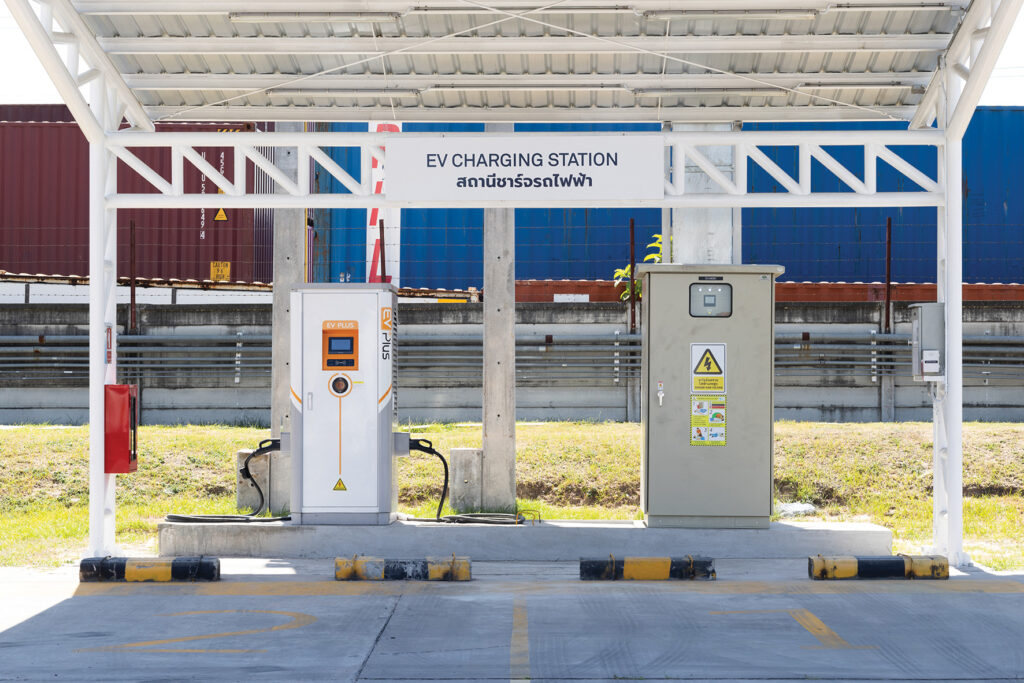
Overcoming Technical Constraints
One of the initial obstacles Yusen Logistics faced was the lack of reliable performance data for EV trucks under real-world conditions. To address this, Yusen Logistics conducted preliminary trials to better understand factors such as driving range and battery life under various cargo weights and road conditions. These trials helped refine the company’s EV deployment strategy and informed the design of routes and schedules to ensure efficient operations.
Mr. Suwajchai explained, “When we first started using EV trucks, the challenge was primarily related to battery technology. Each charge allows the truck to operate approximately 200 to 300 kilometers, depending on the weight of the cargo and road and traffic conditions. Therefore, the challenge lies in optimizing the usage cycles of the EV trucks. Sometimes, instead of completing two full trips, they might only manage one and a half trips because the truck needs to stop for recharging.
Traditional fuel-powered trucks can operate more than 500 kilometers per day (depending on truck types), but EV trucks need to return for charging after about 200 kilometers. As a result, we must adjust our transportation planning to align with these limitations, such as determining appropriate routes and scheduling recharging times. This is especially necessary because the charging stations we rely on are still limited, the charging cost is relatively high, and some routes lack sufficient charging stations. These factors constrain the routes we can service.”
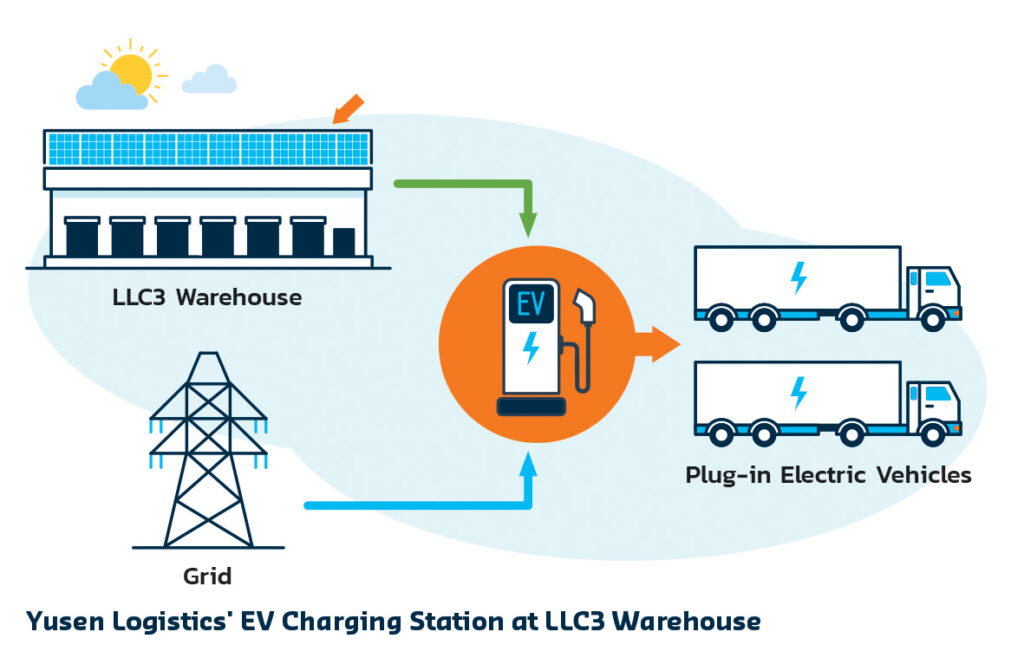
Innovative Charging Infrastructure
Yusen Logistics has constructed a dedicated charging station at its LLC3 warehouse in Chonburi to support the EV fleet. This strategic location near Laem Chabang Port minimizes costs. It enables convenient access for Yusen Logistics’ vehicles while reducing reliance on public charging stations, which can be both costly and less convenient. By installing charging stations at its facilities, Yusen Logistics can harness solar energy generated by rooftop panels at LLC3 to power its EV trucks, further decreasing energy costs and emissions associated with electricity use.

With this new infrastructure, Yusen Logistics can charge two EV trucks simultaneously. The company also has plans to increase the number of charging stations in response to fleet expansion in the coming years, provided that the necessary operational and market conditions align.
Mr. Pimarn stated, “While operating EV trucks sounds like an environmentally friendly option, the issue in Thailand is that we still rely heavily on electricity from the national grid, which is not 100% clean. The electricity generation here depends on coal, gas, and other non-renewable sources. As a result, the emissions reduction from using EVs isn’t truly zero. In Thailand, EV usage can claim only a 30% reduction in emissions.
This presents a challenge for Yusen Logistics Thailand: how can we further reduce emissions, given our investment in EVs, while the energy source remains unclean? To address this, we initiated a project to connect our charging stations to solar energy generated by the rooftop solar panels at our LLC3 warehouses. This allows our first EV truck fleet to charge during the day using solar power.”
He continued, “This initiative significantly improves emissions reduction, especially during the daytime when we can charge directly from clean energy sources. Although we still need to rely on the national grid at nighttime, it is a promising start. We are also planning to expand charging stations at other warehouses and are exploring using energy storage batteries to enable nighttime charging with clean energy.”
Broader Impact and Future Outlook
Yusen Logistics sees its EV and charging station project as part of a broader movement within Thailand’s logistics industry towards sustainable practices. While Yusen Logistics has noted that the broader industry’s enthusiasm for green technology and alternative energy sources is influencing its strategy, it also recognizes its role as a leader in advancing sustainable logistics solutions. The company anticipates that its progress in EV deployment may inspire other logistics firms in Thailand to consider similar initiatives, contributing to an industry-wide shift toward environmentally friendly practices.
However, Yusen Logistics remains cautious about the long-term environmental impact of EV technology. Questions surrounding the disposal and recycling of EV batteries and end-of-life disposal costs are areas the company is closely monitoring. Despite these uncertainties, Yusen Logistics maintains that EVs represent the most viable solution currently available for substantial CO₂ reduction.
Looking ahead, Yusen Logistics plans to continue exploring alternative green energy options, including biofuels, hydrogen-powered trucks, and other advanced technologies as they become viable. This commitment is aligned with Yusen Logistics’ global sustainability goal of reducing CO₂ emissions by 45% by 2030 and achieving net-zero emissions by 2050. The company’s strategy includes a phased approach to integrating EVs and other technologies based on evolving market dynamics, government policies, and technological advancements.
In conclusion, Yusen Logistics Thailand’s recent deployment of EV trucks and investment in charging infrastructure mark a significant milestone in the company’s commitment to sustainable logistics. By proactively addressing the challenges and opportunities of EV technology, Yusen Logistics is positioning itself as a forward-thinking player in Thailand’s logistics industry, setting an example for how businesses can contribute to a greener, more sustainable future.
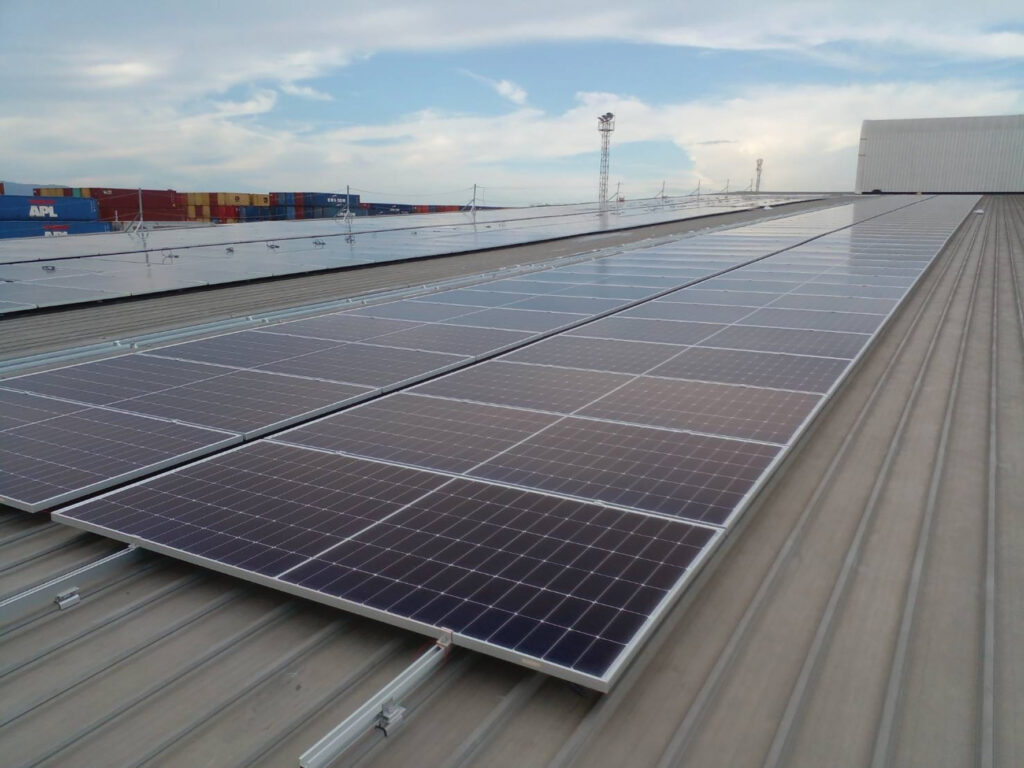
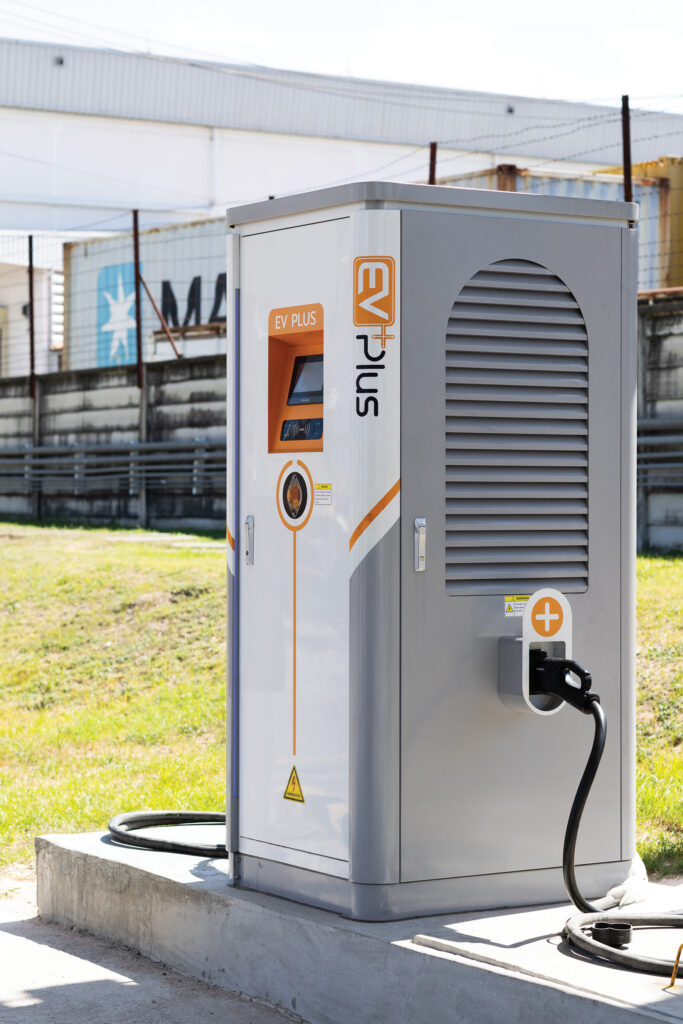
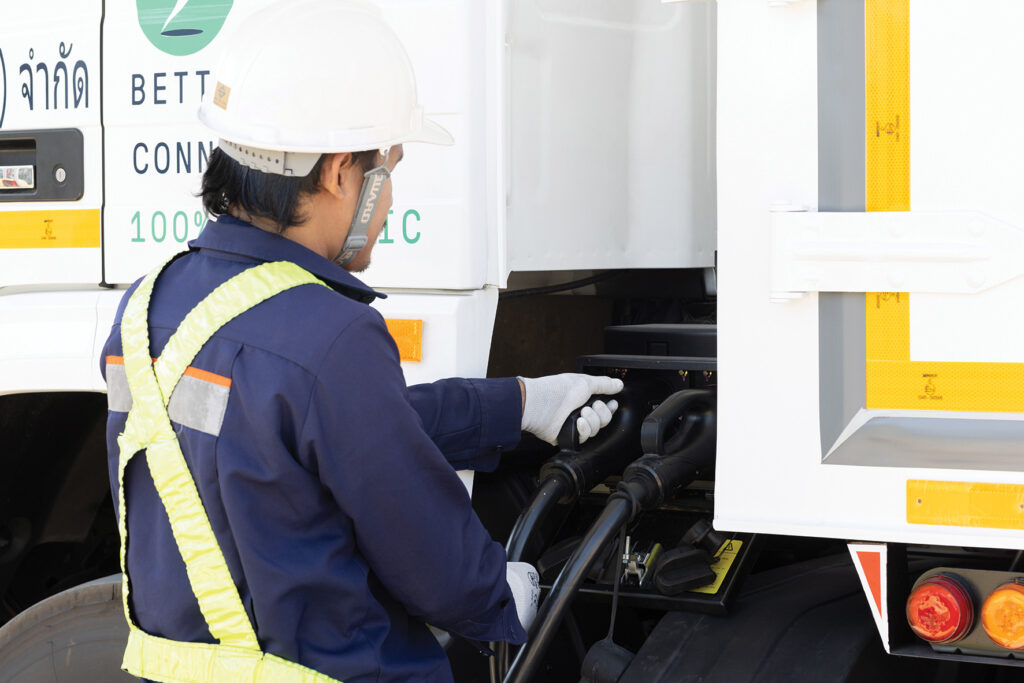
อัพเดตข่าวสารและบทความที่น่าสนใจในอุตสาหกรรมโลจิสติกส์ก่อนใคร ผ่าน Line Official Account @Logistics Mananger เพียงเพิ่มเราเป็นเพื่อน @Logistics Manager หรือคลิกที่นี่




